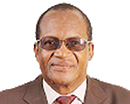Bad news the cold war is back
Putin denies seeking domination of Europe but seems determined to exploit the EU’s vulnerabilities

By Samuel Baligidde
Bad news. With the unceremonious end of the INF, hailed as a cornerstone of disarmament [as we have now come to learn an apparently ineffective one], the Cold War is back! Russian President Vladimir Putin has consequently warned that Russia will deploy missiles targeting decision-making centres if Washington sends missiles to Europe [New Vision, February 21, 2019].
With Russia's resolve not to give in to American pressure having caused US withdrawal from the treaty the death knell of ‘the logic of zero' that was the ultimate goal of disarmament has tolled. After years of trying to avoid a nuclear confrontation the two eternal antagonists now dishearteningly seem resigned to it.
The apocalyptic outcome of withdrawal might be that US-Russian statements and those of some such other warmongers may no longer be the usual ‘saber-rattlings or lay like ineffective threats' in international conference halls described by Claude Innis in her classic International Relations textbook of the yesteryears Swords into Plowshares, as chambers for expending ‘hot air'.
WMDs may indeed start ‘flying the skies, sailing the oceans, or rolling on heavy trucks along beaches or city streets' as some of them have already done in the Middle and the Far East. By announcing it will develop hypersonic IRMs, Russia has unbalanced an already difficult to balance multivariateous armaments equation.
Mr Putin acknowledges the US has the capacity to quickly develop them. The revelation by him that other countries continue to develop weapons that are banned for the US and Russia indicates the complexity of weapons diplomacy.
Mr Putin denies seeking domination of Europe but seems determined to exploit the EU's vulnerabilities caused by President Donald Trump's disinterest in spending more money in NATO. He has as a result succeeded in improving the bilateralization of Russia's relations with Germany, France and the EU. That puts the US at a geopolitical disadvantage.
The much-hyped pretence of a Trump-Un conviviality is not aimed at saving the world but perhaps designed to atone for America's lost glory and influence. Never mind the inconsistency of Washington's alleged perception of Jong-Un and Putin being ‘high maintenance [diplomatic] partners'.
Trust the State Department's diplomats for having the skills [backed by appropriate diplomatic language] to wriggle out of such inconsistencies if Mr Trump does not clog the system by throwing seemingly undiplomatic tweet spanners in the works.
Anyhow, the tenuous nature of relations between the former World War II allies was obviated in 1946 when Marshall Joseph Vissarionovich Stalin spoke of "the inevitability of conflict with capitalist powers" whereupon on 22 February 1946 Moscow-based US diplomat George Kenan dispatched to Washington a historic report with the header, "the Source of Soviet conduct".
He informed his superiors at the US State Department of the threat of a looming fundamental ideological clash and that the Soviet government perceived US-Soviet relations as "living in antagonistic capitalist encirclement with no permanent peaceful coexistence". In plain language, this can be summarized with one word: hostile! As a result of the ideological war that ensued thereafter, both superpowers developed the nuclear capability to mutually destroy each other along with the rest of the world.
Diplomatic conviviality seems more than ever to be determined by power and ideological passion; both of which the Putin, Trump and Jong-Un triumvirate abundantly exude.
President Putin's proactive strategic Foreign Policy, Jong-Un's alleged obsession with long-range nuclear ballistic missiles to carry and deliver nuclear warheads, and Trump's passion for "making America great again" no matter how will now determine the Endgame.
Writer teaches at Uganda Martyrs University - Nkozi and is a member of the IGAD High Level Mediation Roster